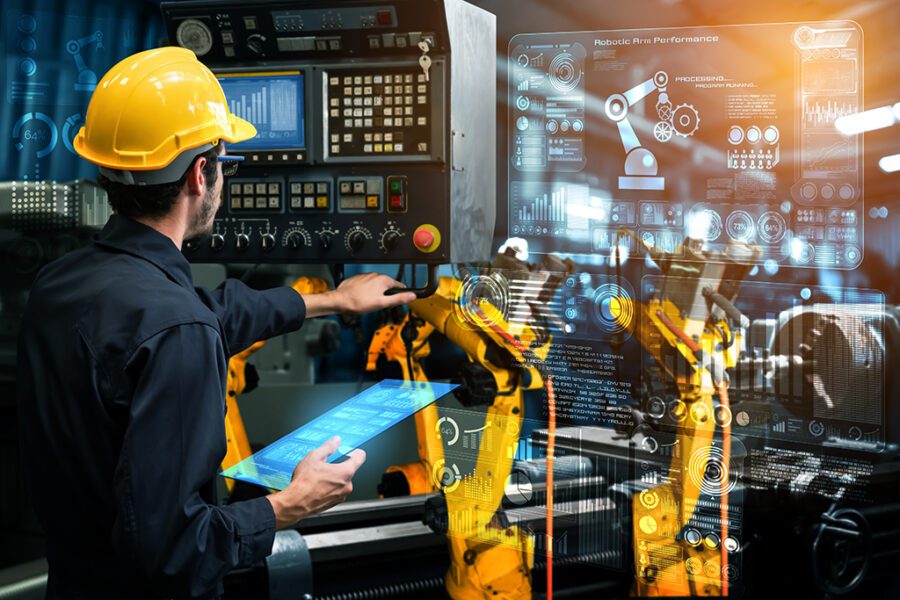Artificial Intelligence (AI) is revolutionizing the manufacturing sector by making production more efficient, reducing waste, and improving sustainability. In an era where environmental concerns are at the forefront, industries are leveraging AI to optimize resource use, lower energy consumption, and minimize their carbon footprint. From predictive maintenance to smart supply chains, AI is playing a crucial role in driving greener manufacturing practices.

In this blog, we will explore how AI enhances sustainability in manufacturing and contributes to waste reduction, leading to a more environmentally friendly and cost-effective industry.
1. AI-Driven Process Optimization
Manufacturing processes often involve complex operations that require precise control to minimize waste. AI-powered systems analyze vast amounts of production data in real time, enabling manufacturers to optimize operations, reduce raw material usage, and enhance efficiency.
How AI Optimizes Processes
- Real-time monitoring: AI continuously tracks and analyzes production metrics to detect inefficiencies.
- Predictive analytics: Machine learning algorithms forecast demand and optimize material usage.
- Automated decision-making: AI-powered systems adjust production settings dynamically to minimize waste.
Example: AI in Metal Fabrication
In the metal industry, AI analyzes cutting patterns to maximize material utilization, reducing scrap metal waste significantly. AI-driven laser cutting machines, for example, ensure minimal excess material is wasted.
2. Predictive Maintenance to Reduce Downtime and Waste
Machine failures often result in unplanned downtime, excess energy consumption, and wasted materials. AI-powered predictive maintenance helps manufacturers avoid these issues by identifying potential failures before they occur.
Benefits of AI in Predictive Maintenance
- Prevents equipment failures: AI analyzes sensor data to detect signs of wear and tear.
- Extends machine lifespan: Proactive maintenance reduces unnecessary part replacements.
- Reduces material waste: Avoids production defects caused by faulty machinery.
Example: AI in Automotive Manufacturing
Automobile manufacturers use AI to monitor robotic assembly lines. If an AI system detects a decrease in efficiency or a potential malfunction, maintenance can be scheduled proactively, preventing costly material wastage and improving productivity.
3. AI-Powered Quality Control to Reduce Defects
Defective products contribute significantly to industrial waste. Traditional quality control methods often rely on human inspection, which can be slow and prone to errors. AI-powered quality control systems use computer vision and deep learning to inspect products with unparalleled accuracy.
How AI Improves Quality Control
- Automated inspections: AI-driven cameras and sensors detect defects at high speed.
- Instant feedback loops: AI systems provide real-time corrections to production processes.
- Pattern recognition: Machine learning identifies recurring defects and suggests process improvements.
Example: AI in Textile Manufacturing
AI-powered vision systems in textile factories detect fabric defects early in production, preventing entire batches from being wasted. This ensures that only high-quality materials move forward in the supply chain.
4. Smart Supply Chain Management to Reduce Overproduction and Waste
An inefficient supply chain leads to overproduction, excessive inventory, and unnecessary waste. AI optimizes supply chains by accurately predicting demand, improving logistics, and reducing surplus production.
AI's Role in Supply Chain Sustainability
- Demand forecasting: AI analyzes historical and market data to predict consumer demand.
- Smart inventory management: AI optimizes stock levels to prevent excess inventory.
- Sustainable sourcing: AI helps select suppliers with eco-friendly practices.
Example: AI in Food Manufacturing
AI helps food manufacturers track demand fluctuations to reduce overproduction. By predicting the exact amount of raw materials needed, companies can minimize food waste while ensuring fresh products reach consumers.
5. Energy Efficiency Through AI-Optimized Power Usage
Manufacturing plants consume vast amounts of energy. AI-driven energy management systems help factories optimize energy use by analyzing real-time consumption data and adjusting power usage accordingly.
Ways AI Reduces Energy Consumption
- Dynamic power adjustments: AI systems regulate energy-intensive processes to run during off-peak hours.
- AI-driven climate control: Smart sensors optimize heating, cooling, and ventilation.
- Renewable energy integration: AI manages the use of solar, wind, or battery storage to balance power needs.
Example: AI in Semiconductor Manufacturing
AI-controlled cooling systems in semiconductor plants optimize air conditioning and ventilation, reducing energy consumption by up to 30%.
6. AI-Enabled Recycling and Waste Management
AI is improving recycling efforts by automating waste sorting and enhancing material reuse strategies. AI-driven robotic sorting systems efficiently separate recyclable materials from waste, ensuring higher recycling rates.
AI's Impact on Waste Management
- Automated waste sorting: AI-powered robots accurately identify and sort recyclable materials.
- Material recovery optimization: AI predicts which materials can be repurposed.
- Circular economy support: AI helps manufacturers design products for easier recycling and reuse.
Example: AI in Electronics Recycling
AI-driven waste sorting systems in e-waste recycling plants accurately separate valuable metals from discarded electronics, improving recovery rates and reducing landfill waste.
Conclusion
The integration of AI in manufacturing is reshaping the industry by enhancing sustainability, reducing waste, and optimizing resource utilization. AI-driven solutions help manufacturers reduce energy consumption, minimize defects, improve supply chains, and promote recycling efforts.
As AI technology continues to evolve, its potential to drive sustainable manufacturing practices will only grow. Companies that embrace AI-driven sustainability not only reduce environmental impact but also gain competitive advantages through cost savings, efficiency, and compliance with green regulations.






